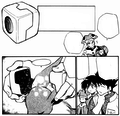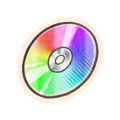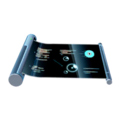TM
- If you were looking for the Trading Card Game Set that uses this abbreviation, see Triumphant (TCG).
- If you were looking for the DLC with a similar abbreviation, see The Teal Mask.

A Technical Machine, or TM for short (Japanese: わざマシン Move Machine), is an item that can be used to teach a Pokémon a move.
Appearance

|
This section is incomplete. Please feel free to edit this section to add missing information and complete it. Reason: Missing TM sprites from the games of the core series. |

TMs are most commonly depicted as discs, but their appearance has varied over time.
In artwork for Pokémon Red and Green, TMs are depicted as a band that can be attached to a Pokémon.
In the TCG, Technical Machines have the appearance of small boxes which a Pokémon's Poké Ball can be inserted into. This depiction was also used in The Electric Tale of Pikachu manga, though in that manga, the box was actually a device that had to be separated and the two halves positioned around the Pokémon's head.
Starting in Pokémon FireRed and LeafGreen, TMs are depicted as compact discs. This depiction was carried over to the Pokémon Mystery Dungeon series.
In Pokémon Origins, TMs and HMs resemble floppy disks.
In Pokémon GO, TMs are depicted as digital paper that retracts into a tube.
In the core series games
From Generation I through Generation IV, TMs are single-use items that are consumed after use, with some TMs being available only once per game. From Generation V to Pokémon Sword and Shield, TMs can be used multiple times without being consumed (though single-use alternatives exist in TRs or Move Tutor moves). In Pokémon Brilliant Diamond and Shining Pearl, as well as Generation IX, TMs return to being single-use, but can be obtained multiple times through shops, trading items, or other means.
Prior to Generation VI, TM moves will also be passed down through breeding if the baby Pokémon can learn that TM (such as passing Flamethrower from a father Typhlosion to a baby Torchic). Prior to Generation V, there were also several Pokémon that could not learn certain TM moves directly from a TM but could learn them via breeding, such as Vulpix with Energy Ball.
TMs are absent in Pokémon Legends: Arceus, and replaced with a Move Tutor.
List of TMs
- Main article: List of TMs
Locations
- Main article: List of TM and HM locations
TMs can be found on the ground or bought at department stores or Game Corners. Some are also given away by Gym Leaders as prizes for defeating them in addition to a Badge.
Changes between generations
Generation I
Generation I includes 50 TMs, with an additional five HMs.
Generation II
Generation II includes 50 TMs, with an additional seven HMs. Many of the TMs differ from Generation I, with most of the newly-introduced TMs teaching newly-introduced moves. In fact, moves contained in all but thirteen TMs (that is, all except TM06, TM14, TM15, TM22, TM25, TM26, TM28, TM29, TM32, TM38, TM39, TM42 and TM44) were changed.
Generation III
Generation III includes 50 TMs, with an additional eight HMs (although only seven are available in Pokémon FireRed and LeafGreen). Many of the TMs differ from previous generations, with some moves that were TMs in Generation I but not II once again being taught by TMs.
TM13, TM24 and TM33 all teach the same moves as in Generation I but different from Generation II. The following TMs that were changed in Generation II contain the same moves as then: TM05, TM10, TM11, TM17-19, TM21, TM23, TM27, TM30, TM36-37, and TM45-47. Moves taught by all other TMs now teach Generation III moves or existing moves that are completely new to being taught by TMs, such as Safeguard or Flamethrower.
In FireRed, LeafGreen, and Emerald, Move Tutors teach several moves that were TMs in Generation I. In Pokémon Emerald, Move Tutors also teach several moves that were TMs in Generation II.
Generation IV
Generation IV includes 92 TMs, with an additional eight HMs. Due to the fact that TMs can be transferred from the Generation III games, the first 50 TMs teach the same moves as in Generation III.
Out of the new TMs, TM54, TM58, TM61-62, TM64, TM67, TM70, TM73, TM75, TM77, TM80, TM82, TM85, and TM90 teach existing moves. All other new TMs teach new moves.
Generation V
Generation V includes 95 TMs, with an additional six HMs. Many of them teach different moves to their corresponding TMs in Generation IV. In Pokémon Black and White, TM95 was originally intended to be obtainable by using the Lock Capsule, an event item which was intended to be distributed to HeartGold and SoulSilver, and then transferred to Black and White via the Relocator. However, the Lock Capsule was never distributed, rendering it, and subsequently TM95, unobtainable in these games. It can be obtained in regular gameplay in Black 2 and White 2.
New moves are taught by TM01, TM03, TM09, TM19, TM23, TM43, TM47-49, TM51, TM55, TM58-60, TM62, TM67, TM72, TM76, TM78-79, TM82-83, TM93, and TM95. TM94 is the only new TM that teaches an existing move.
TMs now have unlimited uses like HMs, rather than being single-use items. In this generation only, when a Pokémon learns a move from a TM or HM by overwriting an old one, the new move takes on the current PP of the forgotten move, preventing repeated usage of machines for PP restoration. The prices of the purchasable TMs are also much higher to reflect the fact they can be reused. TMs can no longer be held (indicating that they can't be traded) or sold.
Generation VI
Generation VI includes 100 TMs, with an additional 5 HMs in Pokémon X and Y and 7 HMs in Pokémon Omega Ruby and Alpha Sapphire. One of the two additional HMs in Pokémon Omega Ruby and Alpha Sapphire—Rock Smash—was a TM in Pokémon X and Y; in Pokémon Omega Ruby and Alpha Sapphire, TM94—the TM that teaches Rock Smash in Pokémon X and Y—instead teaches Secret Power. Most TMs contain the same moves that they did in Generation V, with the exceptions of TM19, TM51, TM83, TM88, and (in Pokémon Omega Ruby and Alpha Sapphire) TM94.
Generation VII
Pokémon Sun, Moon, Ultra Sun, and Ultra Moon include 100 TMs. HMs no longer exist, although the former HM moves Fly, Waterfall, and Surf became TMs instead. This is because the overworld uses of the HMs are replaced with the Poké Ride feature. The only TMs that were changed between Generation VI and Generation VII are TM01, TM28, TM59, TM67, TM70, TM76, TM94, and TM98.
Pokémon: Let's Go, Pikachu! and Let's Go, Eevee! include 60 TMs, with no HMs, as they are replaced with Secret Techniques. Every TM teaches a different move to what it taught in the Alola games.
Generation VIII
Sword and Shield
In Pokémon Sword and Shield, TMs remain virtually identical to how they work in the previous generation, with no HMs and 100 TMs in total. However, this generation prompted the inclusion of 100 new Technical Records (known as TRs for short), which function as single-use items similar to how TMs worked prior to Generation V. The moves contained in TRs are all different from TM moves. Unlike in previous generations, TMs and TRs are numbered starting from 00, not 01; to make up for this, TM100 has been removed.
Brilliant Diamond and Shining Pearl
In Pokémon Brilliant Diamond and Shining Pearl, TMs are single-use again, but unlike in Diamond and Pearl, Gym Leaders now give five of the same TM.
Unlike in previous games, TMs stayed the same as in Diamond and Pearl, with the exception of:
- TM10, which now teaches Work Up instead of Hidden Power.
- TM21, which now teaches Dazzling Gleam instead of Frustration.
- TM27, which now teaches Low Sweep instead of Return.
- TM43, which now teaches Volt Switch instead of Secret Power.
- TM49, which now teaches Scald instead of Snatch.
- TM62, which now teaches Bug Buzz instead of Silver Wind.
- TM63, which now teaches Nasty Plot instead of Embargo.
- TM78, which now teaches Snarl instead of Captivate.
- TM83, which now teaches Bulldoze instead of Natural Gift.
The eight HMs from Diamond and Pearl are now TM93 through TM100, in the same order.
Generation IX
TMs return to being single-use. Once a TM is obtained, they can be crafted at a Pokémon Center using the TM Machine, using League Points and TM Materials dropped by defeating or catching wild Pokémon. Like TRs, if a Pokémon forgets a move taught by a TM, it can now be relearned for free without using another TM. Unlike previous generations, TMs have a 3-digit number rather than a 2-digit number. There are 229 TMs in Pokémon Scarlet and Violet: out of those, only the first 171 were present since the game's launch.
TM016, TM017, TM026, TM031, TM173, TM174, TM185, TM206, TM216, and TM223 all teach existing moves that weren't available outside of leveling up, tutoring, or breeding. TM020, TM021, TM022, TM052, TM124, TM171, TM207, TM210, TM225, TM226, TM227, TM228, and TM229 teach new moves.
Moves that were previously only learnable via Move Tutors (the elemental Hyper Beam variations for fully evolved first partner Pokémon, pledge moves, Draco Meteor, and Steel Beam) have been repurposed as TMs.
Incompatible Pokémon
Although most Pokémon are able to learn a wide range of TM moves, there are 24 Pokémon that cannot learn any move through TM that isn't available to them through other means, with a few exceptions. Typically, these Pokémon are low in their evolutionary line or rely on a specific set of moves. Starting in Generation VI, several of these Pokémon that were able to learn TM moves by leveling up are now able to learn the moves through TM as well.
Near-universal TMs
With few exceptions, all Pokémon who are compatible with TMs can learn the following moves:
| |||||||||||||||||||||||||||||||||||||||||||||||||||||||||||||||||||||||||||||||||||||||||||||||||||||||||||||||||||||||||||||||||||||||||||||||||||||||||||||||||||||||||||||||||||||||||||||||||||||||||||||||||||||||||||||||||||||||||||||||||||||||||||||||||||||||||||||||||||||||||||||||||||||||||||||||||||||||||||||||||||||||||||||||||||||||||||||||||||||||
TM-exclusive moves
In every generation, there have been moves exclusively taught by TMs:
| |||||||||||||||||||||||||||||
Returning moves
Several moves taught by TM in an earlier generation returned as TMs later on after being absent but assigned with a different TM number.
| |||||||||||||||||||||||||||||||||||||||||||||||||||||||||||||||||||||||||||||||||||||||||||||||||||||||||||||||||||||||||||||||||||||||||||||||||||||||||||||||||||||||||||||||||||||||||||||||||||||||||||||||||||||||||||||||||||||||||||||||||||||||||||||||||||||||||||||||||||||||||||||||||||||||||||||||||||||||||||||||||||||||||||||||||||||||||||||||||||||||||||||||||||||||||||||||||||||||||||||||||||||||||||||||||||||||||||||||||||||||||||||||||||||||||||||||||||||||||||||||||||||||||||||||||||||||||||||||||||||||||||||||||||||||||||||||||||||||||||||||||||||||||||||||||||||||||||||||||||||||||||||||||||||||||||||||||||||||||||||||||||||||||||||||||||||||||||||||||||||||||||||||||||||||||||||||||||||||||||||||||||||||||||||||||||||||||||||||||||||||||||||||||||||||||||||||||||||||||||||||||||||||||||||||||||||||||||||||||||||||||||||||||||||||||||||||||||||||||||||||||||||||||||||||||||||||||||||||||||||||||||||||||||||||||||||||||||||||||||||||||||||||||||||||||||||||||||||||||||||||
In the spin-off games
Pokémon Mystery Dungeon series
In Pokémon Mystery Dungeon: Red Rescue Team and Blue Rescue Team and Pokémon Mystery Dungeon: Explorers of Time, Darkness and Sky, the TMs for weather summoning moves, as well as Double Team, Rock Tomb and Snatch, do not exist, and instead have been replaced by appropriate Wonder Orbs. After use, a TM becomes a Used TM; a Used TM can be turned back into a usable TM by a Pokémon with the move Recycle, except for a Used TM of Recycle, which will remain a Used TM permanently. Pokémon can learn the same TMs they can learn in the corresponding core series games, but Pokémon that cannot learn TMs in the core series games can learn moves via TM if they can also learn those moves by level up.
In Explorers of Time, Darkness and Sky, Dive is a TM, even though it is not a TM in Generation IV core series games. However, no Pokémon are specifically coded to learn it, and thus the only Pokémon compatible with it are those that already learn it by level-up.
In Pokémon Mystery Dungeon: Gates to Infinity, all TMs are infinite use. Special TMs for moves usually learned through a Move Tutor in the core series games are also present. Wide Slash and Vacuum-Cut are no longer available starting from this game.
In Pokémon Super Mystery Dungeon, there are two types of TMs: single-use regular TMs and reusable rainbow-colored TMs. Rainbow-colored TMs can be purchased from Kecleon shops from certain post-game dungeons, and can also be purchased from Kecleon shops in towns after Kecleon has been connected with the Expedition Society, which unlocks the "Treasures" section in the shop.
In Red Rescue Team and Blue Rescue Team, and in Explorers of Time, Darkness, and Sky, there are two moves that do not appear in the core series games that can only be learned by TM: Wide Slash and Vacuum-Cut. These moves do not appear in subsequent games.
In Explorers of Sky, TMs can be sold to Kecleon for 250 Poké.
Appearance
| TM sprite from Red and Blue Rescue Team |
TM sprite from Explorers series |
TM sprite from Mystery Dungeon (WiiWare) |
TM sprite from Gates to Infinity |
TM sprite from Super Mystery Dungeon |
Rainbow TM sprite from Super Mystery Dungeon |
| TM sprite from Rescue Team DX |
Rainbow TM sprite (unused) from Rescue Team DX | ||||
| Used TM sprite from Rescue Team series |
Used TM sprite from Explorers series | ||||
| TM sprite (for tutor moves) from Gates to Infinity |
TM sprite (for tutor moves; unused) from Super Mystery Dungeon |
Rainbow TM sprite (for tutor moves; unused) from Super Mystery Dungeon | |||
| TM icon from Rescue Team series |
TM icon from Explorers series |

|

|

|

|

|

|
| Model of TM from Gates to Infinity |
Model of TM (for tutor moves) from Gates to Infinity |
Model of TM from Super Mystery Dungeon |
Unused model of a used TM from Super Mystery Dungeon |
Unused model of TM (for tutor moves) Super Mystery Dungeon |
Unused model of used TM (for tutor moves) from Super Mystery Dungeon |
Artwork

|
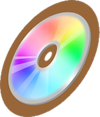
|
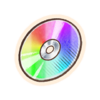
|

|
| Explorers artwork | Super Mystery Dungeon artwork | Rescue Team DX artwork | Unused Rescue Team DX artwork for Used TM |
Pokémon GO
In Pokémon GO, there are four kinds of TMs: Fast TMs, Charged TMs, Elite Fast TMs, and Elite Charged TMs. TMs were introduced to Pokémon GO on June 22, 2017, and Elite TMs were introduced on April 24, 2020. All TMs are consumed after one use.
Using a Fast or Charged TM on a Pokémon randomly changes its Fast or Charged Attack, respectively, to a different move in the Pokémon's current move pool.
Elite TMs allow players to select the new move that will be learned, even including legacy and event-exclusive moves, such as Community Day moves.
Appearance

|

|

|

|
| Fast TM from Pokémon GO |
Charged TM from Pokémon GO |
Elite Fast TM from Pokémon GO |
Elite Charged TM from Pokémon GO |
In the anime
Main series
Although TMs have not appeared in the anime, they were mentioned once in the Japanese version of Pokémon Mystery Dungeon: Team Go-Getters Out of the Gate!. While talking with the Kecleon Brothers, Charmander of Team Go-Getters mentioned TMs among other things the Kecleon Shop was sold out on. This reference was not included in the dub.

Pokémon Origins
TM34 (Bide) appeared in File 1: Red. Much like in Pokémon Red and Blue, it was given to Red by Brock as a reward for defeating him in a Gym battle.
Another TM, TM28 (Dig), also made a brief appearance in File 2: Cubone, where Red retrieved it from a Team Rocket Grunt who had stolen it.
In the manga


The Electric Tale of Pikachu
In To Evolve or Not to Evolve, That Is the Question!, Ash used TM31 to teach Mikey's Eevee Mimic, allowing it to win a battle against Sparky's Jolteon and thus let Mikey join the Knights of the E Stone.
Pokémon Adventures
Red, Green & Blue arc
In Wartortle Wars, a fake TM was seen amongst the many fake items sold to Red by Green.
Gold, Silver & Crystal arc
In Elekid Incorporated, Silver mentioned that he had used TM21 to teach his Totodile Frustration in order to capitalize on the fact that he had only just stolen the Pokémon and it hadn't come to like him yet.
Omega Ruby & Alpha Sapphire arc
In Diancie Shines, it was explained that TMs are machines that contain the essence of the move they teach to a Pokémon. Before this technology existed, other items served the same purpose. Such items are the rings Ultima carries on her staff, which contain the ultimate moves Frenzy Plant, Blast Burn, and Hydro Cannon, and a scroll held by the Draconids, which contains the move Dragon Ascent.
Sword & Shield arc
In Toasty!! Battle Against Toxapex, Henry revealed he had used a TM for Sunny Day on his Thwackey in preparation for dealing with Nessa's Toxapex during their Gym battle.
Scarlet & Violet arc
In PASV06, Nemona received a TM for Aerial Ace as a prize for defeating five Trainers in South Province (Area Two) when visiting the Cortondo Pokémon Center.
In the TCG

In the TCG, a Technical Machine is a Trainer card depicting a Technical Machine. Each one has an attack printed on it. They can be attached to a Pokémon, and doing so allows the Pokémon to use the attack printed on the Technical Machine card instead of one of the attacks on the Pokémon's card.[1]
Technical Machines have two different mechanical representations across the TCG's history, though both adhere to the above definition.
Technical Machine (Trainer subtype)
- Main article: List of Technical Machine cards
Starting from Pokémon VS in Japanese and Expedition in English, Technical Machine is a type of Trainer card. These cards can be attached to Pokémon in play. The majority of them can only be attached to Pokémon of a specific type or those that include a specific owner in their name, but other restrictions have been used and a few cards have no restriction at all. Each card provides an attack that can be used in addition to any attacks featured on the Pokémon it is attached to. In most cases, a player is required to discard a Technical Machine card at the end of the turn they played it. The final Technical Machine cards, the ones printed in Legends Awakened and Rising Rivals, are exceptions to this last clause.
A Pokémon can have multiple TMs attached to it at once. This functionality is fairly useless since most Pokémon can only attack one per turn and therefore can only use an attack from one Technical Machine per turn, while both used and unused Technical Machines will be discarded.[2]
Some cards have numbers at the end of their name, normally starting from "01" and counting up with each card that otherwise has the same name. However, the only cards with an "02" card to follow them are Japan exclusive, only being printed in Pokémon VS. No cards have "03" or any third member to a numeric order. The two cards in Legends Awakened, Technical Machine TS-1 and Technical Machine TS-2, are the sole English examples of a numbering system with more than one entry in English. The final card to bear the card type, Team Galactic's Invention G-107 Technical Machine G, uses a "G" in place of a number.
After the Rising Rivals expansion, Technical Machine cards were seemingly retired in favor of Pokémon Tool cards that provide additional attacks.
A number of sets have variations on the Technical Machine concept, keeping the card type and mechanics but changing the name and appearance of the item. They do not use numbers like the normal TMs, being distinguished by symbols or additional words instead.
Miracle Sphere

A Miracle Sphere is one of three cards from the Skyridge expansion. They are Miracle Sphere α, Miracle Sphere β, and Miracle Sphere γ. The ends of their names have a Greek letter. Each Miracle Sphere can only be attached to Evolved Pokémon of three specific Energy types. One of those types is used in the cost of the attack of the Miracle Sphere. If the Pokémon has a Basic Energy card attached to it of the type in the attack's cost and a Basic Energy card attached to it of one of the other two types, the attack becomes stronger in some way, either adding an additional effect or dealing increased damage and having an additional effect. If there are Basic Energy cards attached to the Pokémon that have all three types, then both effects happen. Also, the attack a Miracle Sphere provides always ends with the word "Force".
The art for these cards shows a sphere glowing in various colors. Writing of an indeterminate language runs across the sphere.
Mystery Plate
A Mystery Plate is one of four cards from the Skyridge expansion. They are Mystery Plate α, Mystery Plate β, Mystery Plate γ, and Mystery Plate δ. Again, the ends of their names have a Greek letter. The attacks on these cards exclusively cost ![]() Energy. They have an effect when the opponent has 5 or more Prize cards remaining, and a different effect when the opponent has a lower number of Prize cards remaining. Mystery Plate α and Mystery Plate β have an effect when the opponent has 1 Prize card remaining, while Mystery Plate γ and Mystery Plate δ have an effect when the opponent has 2 Prize cards remaining. These second effects are more powerful than the first effect. However, between either of the two points, and after the second point in the case of Mystery Plate γ and Mystery Plate δ, the attack has no effect.
Energy. They have an effect when the opponent has 5 or more Prize cards remaining, and a different effect when the opponent has a lower number of Prize cards remaining. Mystery Plate α and Mystery Plate β have an effect when the opponent has 1 Prize card remaining, while Mystery Plate γ and Mystery Plate δ have an effect when the opponent has 2 Prize cards remaining. These second effects are more powerful than the first effect. However, between either of the two points, and after the second point in the case of Mystery Plate γ and Mystery Plate δ, the attack has no effect.
The art for these cards shows a stone slab, with text of an indeterminate language written on it.
Ancient Technical Machine

An Ancient Technical Machine is one of three cards from the EX Hidden Legends expansion. They are Ancient Technical Machine [Ice], Ancient Technical Machine [Rock], and Ancient Technical Machine [Steel]. Their names all end in the name of a type encased in brackets. They use the name of a type from the video games and not the equivalent Energy type.
These cards can only be attached to an Evolved Pokémon, and that Pokémon cannot also be an Pokémon-ex or an Owner's Pokémon. The attack an Ancient Technical Machine provides exclusively costs ![]() Energy, and its name ends with the phrase "Generator".
Energy, and its name ends with the phrase "Generator".
The art for these cards shows a opened clam-shaped device with a shape floating in the distant half.
Technical Machine (Pokémon Tool)

In Paradox Rift expansion in the Scarlet & Violet Series (in Japan the Raging Surf subset in the Scarlet & Violet Era), over 14 years since the last Technical Machine card, Technical Machines returned to the Trading Card Game. This set of cards are a group of Pokémon Tool cards which have an attack printed on them that the Pokémon the card is attached to can use. As they are Pokémon Tools, they carry the restriction of that card type where a Pokémon can only have a single Pokémon Tool attached to it. This further means that a Pokémon cannot have more than one of these Technical Machine cards attached to them at a time.
These cards have a new naming structure, starting with "Technical Machine:" followed by the name of the attack that they provide.
While no longer depicted as a distinct type of Trainer card, these cards are still discarded at the end of the turn.
These cards' artwork use the optical disk appearance of TMs from the video games, instead of the TCG's cube appearance.
In the magazines
Pokémon Power
In Pokémon Power (issue 3, page 3), there is a small ad about buying used TMs: "Save big on used TMs! Call Now! 555-POKE!"
Trivia
- 343 different moves have been available as a TM, adding together the TMs from every generation.
- Gym Leaders who give out a TM on their defeat typically give out one containing a move of their specialty type. However, in their respective first generation of an appearance each, Brock and Falkner do not, giving out TM34 (Bide) (a Normal-type move) and TM31 (Mud-Slap) (a Ground-type move), respectively. This is rectified in the remakes of their debut games, with Brock giving away TM39 (Rock Tomb) while Falkner's prize is TM51 (Roost). Likewise, Cilan, Chili, and Cress do not give out TMs matching their specialty type, instead giving out the Normal-type TM83 (Work Up), regardless of which of the three is battled.
- Prior to Generation III, TMs given out by the starting region's Gym Leaders teach moves that no Pokémon learns naturally. There is one exception: in Pokémon Yellow, Pikachu learns Thunderbolt in place of Swift.
- Generation IV is the first generation in which there is at least one TM that teaches a move of each Pokémon type.
- Generation I had no TMs for Bug- or Ghost-type moves, Generation II had none for Flying, and Generation III had none for Bug. Because of the last case, the Bug-type TM sprite goes unused in Generation III, while the sprite that would've been used for a Bug-type TM in Pokémon FireRed and LeafGreen's TM Case goes completely unused.
- Generation IX has the most TMs, with 229, and Generation I, II, and III are tied for the fewest TMs, with 50.
- The largest TM increase across generations was from VIII to IX, adding 129 TMs. The smallest increase was from IV to V, adding only three.
In other languages
| |||||||||||||||||||||||||||||||||||||||||||||||||||
References
- ↑ Pokémon Trading Card Game Rules, Paradox Rift
- ↑ Compendium ruling, Compendium BW, Team Compendium, PUI Rules Team, Jan 26, 2006
See also
- HM
- TR
- List of Technical Machine cards
- Move Tutor
- List of TM and HM locations in the Pokémon Mystery Dungeon series
| |||||||
| |||||||||||||||||

|
This article is part of Project Moves and Abilities, a Bulbapedia project that aims to write comprehensive articles on two related aspects of the Pokémon games. |
